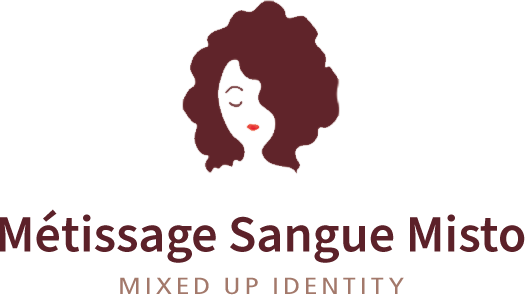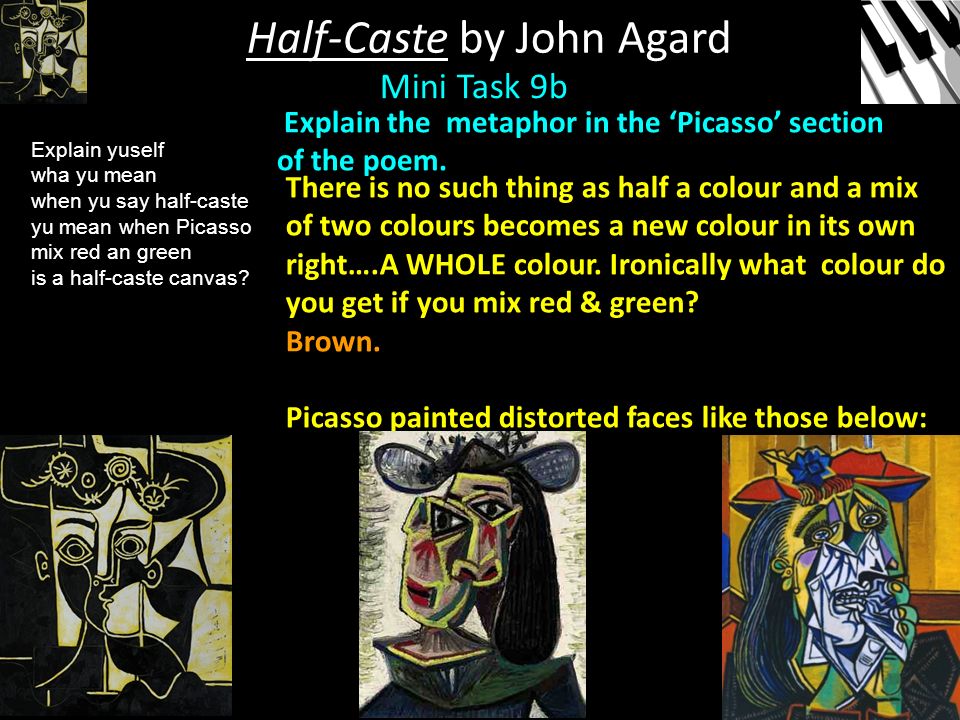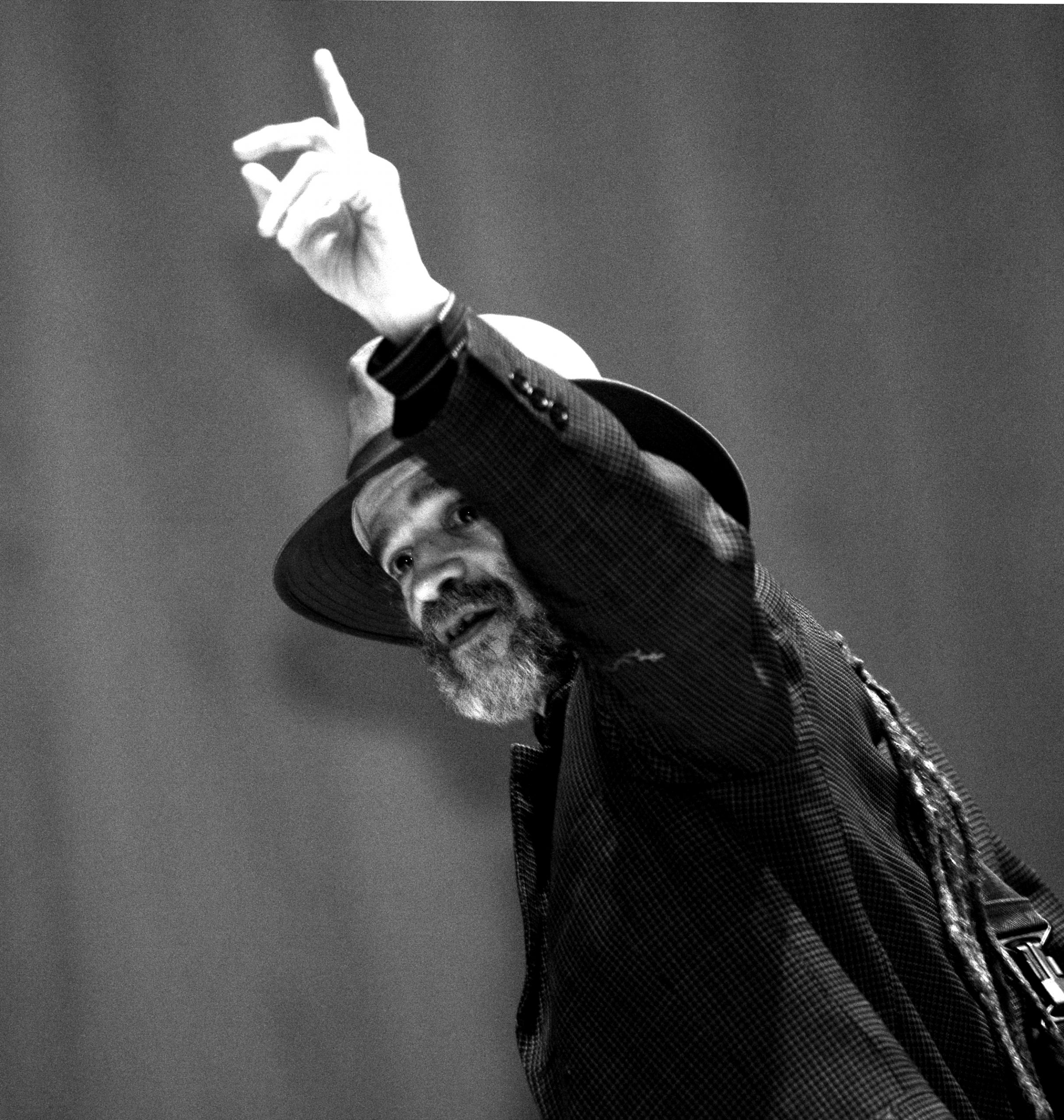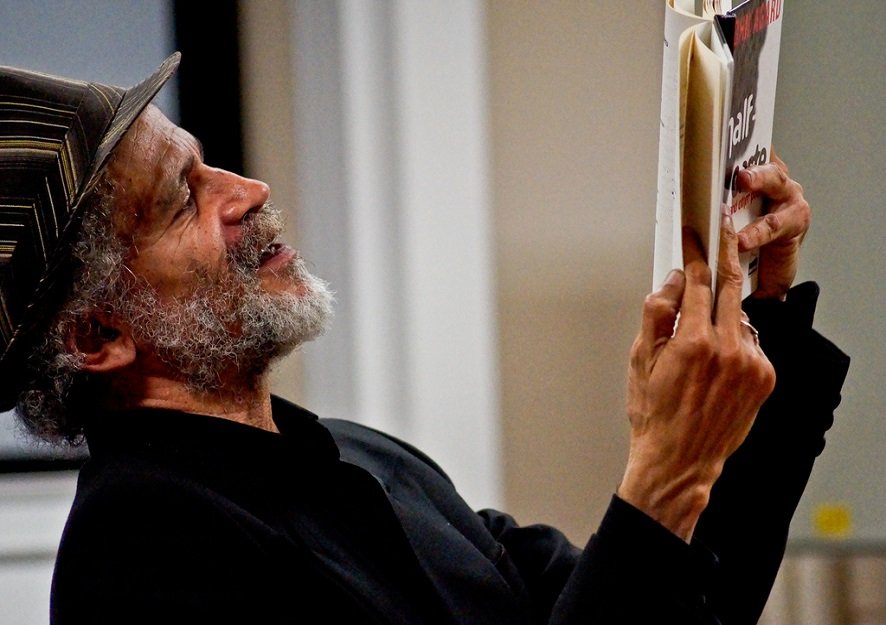
“Half-Caste“ is a poem by John Agard that looks at people’s ideas and usage of the term “half-caste“. The poem is taken from Agard’s 2005 collection of the same name, in which he explores a range of issues affecting black and mixed-race identity in the UK. It is one of the set poems for English schools, but its influence and presence extends well beyond them, making John Agard one of the most popular, well-known, and respected poet-performers on the school’s circuit. The poem is written in the first-person. Agard uses phonetic spelling throughout the poem, in order to create the voice of the speaker.
John Agard was born in Georgetown, British Guiana on 21 June 1949. He is an Afro-Guyanese playwright, poet, and children’s writer, now living in Britain. His love of language began in school where his favorite subjects were English, French, and Latin and, listening to cricket commentary on the radio, he was deeply affected by the verbal wit of calypso and the poetic commentary of legendary commentator, John Arlott, and tried to make up his own for matches: there he really realized he loved to play with language! Then, as a Catholic altar boy, he was attracted by the call-and-response style of the Latin mass. He started writing poems while he was still at school.
He taught the languages he had studied and worked in a local library. He was also a sub-editor and feature writer for the Guyana Sunday Chronicle, publishing two books while he was still in Guyana. He moved to England in 1977 and became a touring speaker for the Commonwealth Institute, visiting hundreds of schools throughout the UK. He has been a writer at the South Bank Centre, London, the BBC, and the National Maritime Museum. His awards include the Casa de las Americas Poetry Prize and the Paul Hamlyn Award.
He lives in Sussex with his wife, the poet Grace Nichols, with whom he co-edited No Hickory No Dickory No Dock (1991) a collection of Caribbean-flavoured nursery rhymes; A Caribbean Dozen; Under The Moon And Over The Sea which was also awarded the CLPE Poetry Award. Their latest anthology for children is Pumpkin Grumpkin, a collection of nonsense poems from around the world.
Through his 45 poems, John Agard explores a wide variety of themes: racial harmony, tension, and diversity; war and religion; society, patriotism, and politics; as well as more personal ideas on relationships, love, and attraction. This is all delivered with a range and depth in terms of content, language, poetic form, and technique that will engage and motivate children while developing their understanding. An ideal collection to sit at the heart of a scheme of work on cross-cultural themes.
He is a versatile writer known for his poems, short stories, children’s literature, drama, and nonfiction; one of the most exciting, energetic, and spellbinding readers you’ll hear, breathing passion and energy into each of his poems when he speaks them aloud. Agard has written lots about what it was like to leave home and the history of the Caribbean, as well as telling stories of his childhood and the myths and legends of Guyana.
He is fascinated with the world, and how everything works, taking inspiration from science and maths as well as legends and fairy tales – he’s able to apply this passion for learning to his writing, with poems about everything from big numbers like the ‘Googol’, to those in the voice of an alarm clock, in ‘Clockwise’, which sits “squat as a toad” ready to steal its owner’s sleep.
Adgard’s readings are an enchantment, bringing his poems to life. In performance, he is electrifying – compelling, funny, moving, and thought-provoking. His work in education over the years has changed the way that readers, writers, and teachers think about poetry. He drops his voice into a whisper to make us lean in to hear him closely, while at other moments he can sound spooky and scary, he’s even been known to burst into song! Listen to how he draws out certain words and sounds to make us feel the energy and emotion of the speakers.
“Half-Caste” is a four stanzas poem inspired by his mixed-race and resulting experiences upon moving to Britain, with his partner, in 1977, where he became angry with people who referred to him as ‘half-caste’. Realizing that most people who say this do so without thinking about what it really means, he tells off people who use this term without thinking. Consequently, the poem is very personal in nature, however remains light-hearted through Agard’s colloquial, humorous and sarcastic tone and use of the occasional basic rhyme or half-rhyme in the absence of a regular rhyme-scheme. This is a poem about asserting your identity against others who would ‘bring you down’.
Half-caste is a derogatory term for a person who is of mixed racial heritage. It is derived from the Latin “Castus”, meaning “pure”, implying that those that are mixed-race are less “pure” compared to those that are not, hence is dehumanizing. Agard comments on the absurdity of this dehumanization by offering the reader a physical interpretation, whereby he compares it to him “standing on one leg” as though he is in some way half a human being.

The speaker, indeed, begins the poem by excusing himself for being half-caste: “Excuse me standing on one leg I’m half-cast”. Though it is evident that it is chock-full of sarcasm: he is not really apologizing. Agard means exactly the opposite. He makes the point that ‘half-caste‘ is an overbearing term designed to make people feel ashamed, ‘excuse me‘ sounds like someone apologizing for being an aberration.
The majority of the poem is filled with the speaker responding to being called half-caste He provides countless examples of the positive sides to being half-caste, asking himself if it being “half-caste” is like Picasso mixing his colors or the dreary English weather, that is filled with cloudy skies. The speaker tells the reader that he will soon tell the “other half” of his story, signifying that his mixed-race, by no means, defines who he is as a person, but there is so much more. The frequent use of the term ‘explain yuself’ is a request by the writer to explain exactly how is someone half-caste, half a person. He goes on to point out that mixes happen in ‘Picasso’s’ and Tchaikovsky’s culture and the result is something beautiful. He also implies that mixes happen in nature (the weather) and that this is natural. Extending the metaphor of the weather with ‘half-caste til them overcast‘, is Agards’ way of implying the’re so much a person that they’re full of themselves.
He then writes how he must be able only to listen with half-a-year, look with half-a-eye, offer us half-a-hand, etc. – a sarcastic, even angry, denunciation of the word ‘half’ in ‘half-caste’. He writes: ‘I half-caste human being cast half-a-shadow’ – here, ‘half-a-shadow’ has a sinister vampire-like tone, and the author seems to be pointing out that by using the word half-caste, people are saying that he is not really human, but inferring that there is something sub-human, even evil about him. He’s showing that half-caste is a very close-minded view of someone’s ethnicity.
He finishes by saying: ‘but yu must come back tomorrow wid … de whole of yu mind’ – here he is pointing out that it is us who have been thinking with only half-a-brain when we thoughtlessly use the word ‘half-caste’. He dispels the idea that he is half a person (an idea that he created to undermine the term), saying that he does indeed have another half to his story. He will only tell this to the person he is addressing, however, if they see him as their equal, disregarding all stereotypes. In this way, he challenges the readers to change their thinking, and come up with a better word.
The language he here uses is a mixture of Caribbean dialect and formal British English. This, very powerfully, gets across and embodies the fact that Agard is of mixed heritage, and he demands an explanation for the use of the term, like he is seeking an intelligent justification, that he knows the person he is speaking to will be unable to provide. Then the direct and many commands serve to point his thoughts directly to the reader and to make the poem challenging and confrontational.
Again, the use of metaphor, comparing ‘half-caste’ to art, the weather, and music, makes the poem a kind of parable and helps to get the point across. He wants to convey the idiocy of the term to the reader and undermine those that label him in this way. When painting, Picasso mixes colors to achieve one closer to what he desires in his pieces. Agard comments on how ridiculous it would be to label a piece of art created in this way as a separate, less valuable entity, which contrasts with racial stereotypes.
Very important is also the way he uses diction. For example, the word “caste” is associated with the word “purity”; therefore, it is easy to assume that “half-caste” is a derogatory term for someone who is in some way impure, and in this case, that means they are not of one single race. While this term was once accepted, it certainly is insulting and today would be considered to be racist and fueled with ignorance and prejudice.
Both sarcasm and poignancy are escalated in a particular section of the poem, when he says : “I’m sure you’ll understand, why I offer yu half-a-hand, an when I sleep at night, I close half-a-eye, consequently when I dream, I dream half-a-dream an when moon begin to glow, I half-caste human being, cast half-a-shadow, but yu come back tomorrow.” Agard, again, undermines the term half-caste by emphasizing the absurd way in which it likens him to being half a human being by in some way being less ‘pure’ compared to those of one ethnicity. The imagery of Agard looking with half an eye to shaking hands with half a hand are comical, although saddening upon reflection. Where Agard claims he dreams ‘half a dream’ implies that firstly if society sees people as half a person they will be treated unfairly, but also that if people think of themselves as half a person they will limit themselves in their own lives. “De other half of my story” implies that we have something to learn and that we are the ones who are incomplete until we do.
Last, but not least, the scathing humor, including the joke, helps to give a point more impact. His feelings sound angry and bitter. He objects to being called half a human being and asserts that there is much more to him than we realize. The words: ‘I half-caste human being’ show that he is insulted by the term ‘half-caste’. His tone is challenging, even threatening (e.g: ‘Explain yuself wha yu mean when yu say half-caste’) as he asserts his identity as a whole human being and demands that readers change their attitudes. In later recordings, Agard does not sound as angry – he even makes a joke of it, and he brings out the humor of phrases such as: ‘Excuse me standing on one leg’. Perhaps this is because fewer people use the term half-caste nowadays. But it may also be that sees the funny side to it himself.
The key message to this short, but a very complex poem, is clearly and powerfully stated. In each of its four sections, each with a different message, even though it is funny and angry, the poem gradually builds up its argument, step by step, that ‘half-caste’ is an unacceptable phrase and we ought not to use it and people should stop judging others for racial difference. This poem very clearly conveys the message behind the poem, by itself. The poet has been very successful in setting his point, through the use of literary tools and devices, which help give the poem lots of emotion, as well as help the reader, comprehend the purpose of the poem.
He once said that “This imposition of half, half, half on a person’s total human complexity implies that some sort of ‘purity’ has been subverted. A child of mixed race is a tangible, loving expression of human beings from different cultural backgrounds getting together – that should be seen not as something threatening, but as something enriching…”
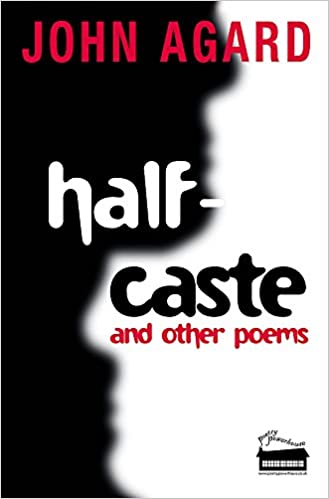
@Wizzy, Afro Bodhisattva, Entrepreneur, Multipotentialite Wantrepreneur, Physical Anthropologist, Freelance researcher of African Studies, culture, tradition and heritage, CEO Dolomite Aggregates LTD and Founder IG MBA Métissage Boss Academy , MBA Metissage & Métissage SangueMisto.

